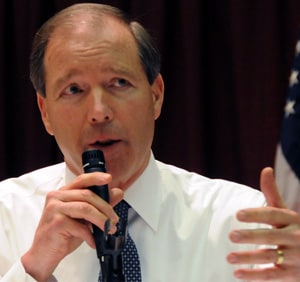
U.S. Sen. Tom Udall, D-N.M. (Photo by Heath Haussamen)
One of the most common messages I hear from the people of New Mexico is a frustration with the way that business is conducted in Washington – or the fact that many important things don’t get done at all. Today, the Senate Rules Committee I serve on will start looking at one of the root causes for this frustration: obstruction in the Senate.
In 2008, I was elected to the Senate amidst a resounding call for change. My colleagues and I arrived ready to tackle our country’s biggest problems, but too often found that kinks in the system — rampant obstruction and entrenched special interests — pose significant obstacles to achieving real progress. We found a broken system that needs reform.
It’s all the more frustrating that this obstruction has served to turn people off to the legislative process.

An Albuquerque resident recently summed up this sentiment in a comment on my Facebook page when he wrote, “I’m done watching the government bicker and spin its wheels… I just can’t stress out about this anymore.”
I can sympathize and I’m working to fix it. I believe that with reform, the spirit of hope and change from 2008 can and will prevail.
A graveyard for good ideas
In the Senate today, legislation often faces the threat of a filibuster – meaning a minority of senators can prevent a majority from acting. Most Americans’ knowledge of a filibuster is based on Frank Capra’s 1939 classic, Mr. Smith Goes to Washington. In the more than 70 years since that film was released, the filibuster has transformed from a rarely and judiciously used procedural tool of debate to a routine weapon of partisan obstruction.
In the 1960s, only 8 percent of legislation faced a filibuster, and in the 1980s it was 27 percent. However, between 2007 and 2009, the filibuster threatened 70 percent of legislation.
The unfortunate result is that the Senate has become a graveyard for good ideas.
One only has to look at the long and winding road of health care reform to know there is something seriously wrong with our system. And just recently, we saw another example, when a single senator used the Senate rules to play politics and ultimately prolong passage of an unemployment benefits bill that otherwise had wide bipartisan support.
Most tellingly, more than 290 bills that have already been passed by the U.S. House of Representatives are now stuck in the Senate due to procedural delays and anonymous “holds” by single senators.
The Constitutional Option
I’ve proposed a simple way for the Senate to examine the rules that got us to this point and reform the system — the Constitutional Option. Article I, Section 5 of the Constitution states, “Each House may determine the Rules of its Proceedings…” At the beginning of the 112th Congress, I will call on the Senate to exercise its constitutional responsibility to adopt its rules of procedure by a simple majority vote.
I recently discussed the Constitutional Option on MSNBC’s The Dylan Ratigan Show, which you can watch below:
By following the Constitution as the framers intended, and adopting the rules of our procedure next January, senators will have the opportunity to come together and vote to get the Senate back to business. It is my hope that a majority of senators agree that we have work to do.
I’m proudly not the first New Mexico senator to propose this. In the 1950s a group of bipartisan senators were frustrated by obstruction in the Senate — far less than what we see today — on some of the most critical legislation of the century. Anti-lynching bills were filibustered in 1922, 1935 and 1938, and anti-race discrimination bills were blocked almost a dozen times starting in 1946.
New Mexico’s own Clinton Anderson led the charge for reform, and moved that the Senate fix its rules through the constitutional option at the start of the 83rd Congress in 1953. Sen. Anderson’s persistence eventually provided the impetus for a compromise on Senate rules.
As abuse of Senate rules has reached new heights, I am picking up where Sen. Anderson left off and pushing for change once more.
One piece of reform
This is just one piece of reforming Washington. I’m also fighting to reform the campaign finance system so that our elections are about the best ideas, not the biggest checkbooks. And I’m committed to increasing accountability and transparency in all levels of our government.
But all of these initiatives are threatened if our Senate doesn’t work properly for the American people.
Find out more about the Constitutional Option at by clicking here or on my Fixing Senate Rules page on Facebook.
Udall, a Democrat, is a U.S. senator from New Mexico.